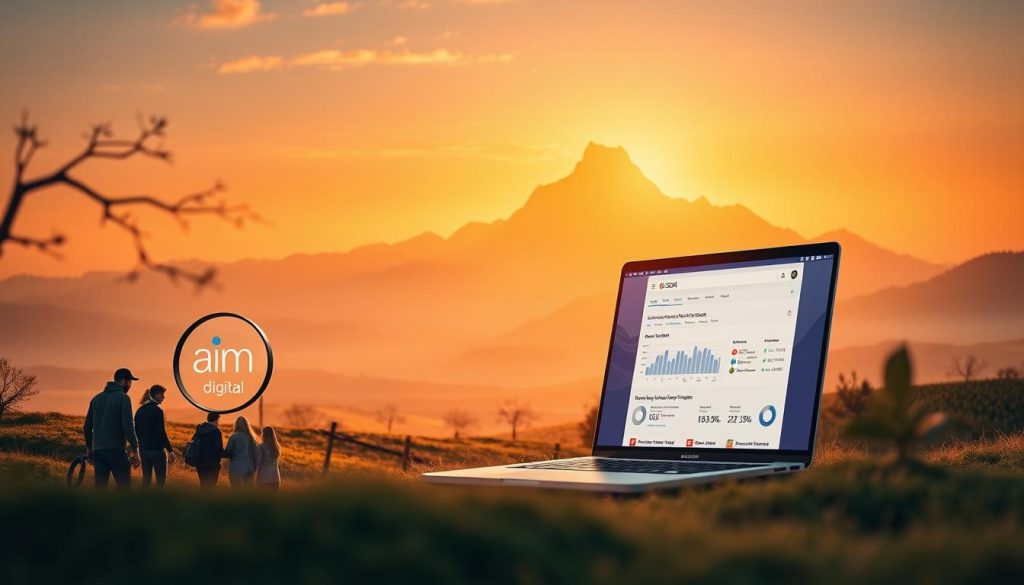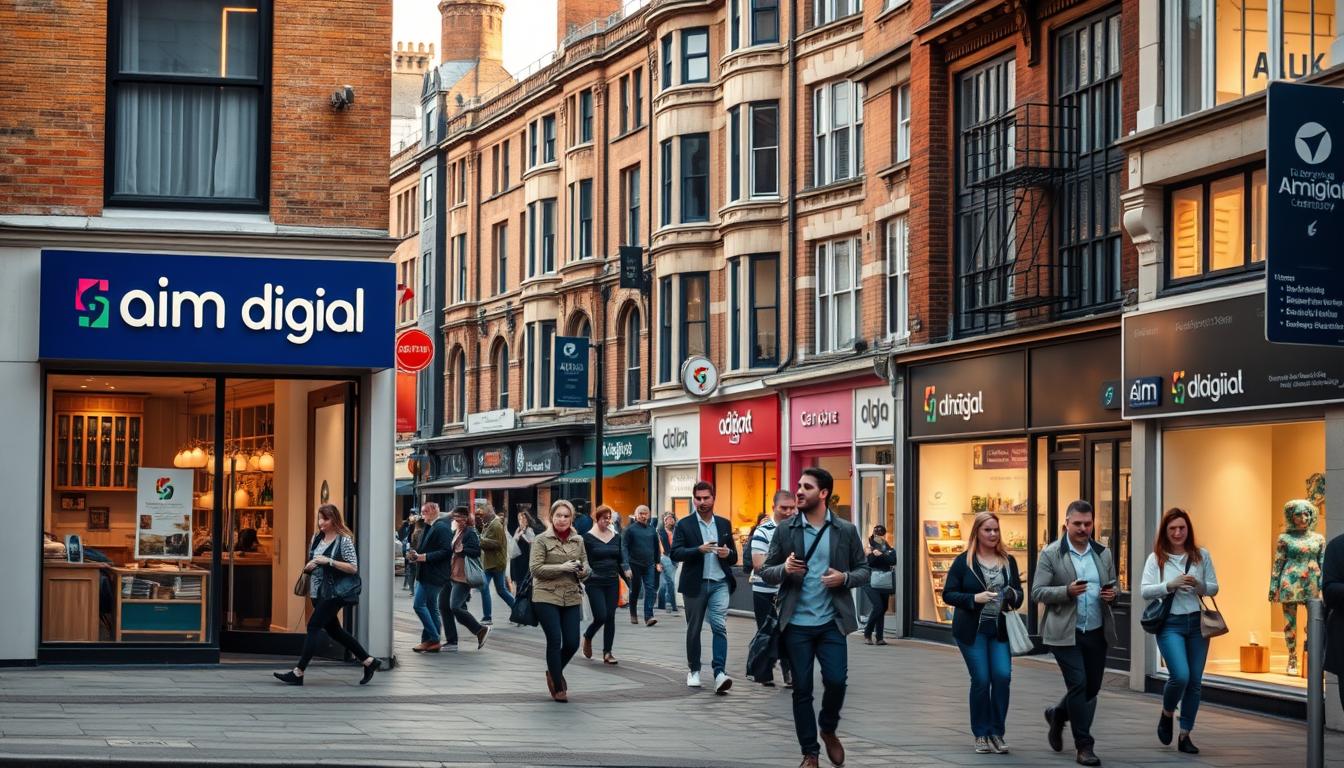In today’s digital world, having a strong online presence is key for businesses to succeed. Our team knows how vital enhancing online visibility and boosting website growth through SEO strategies are.
Geoff Crain, Senior Director, Sales & Marketing at Kingstar Media, says, “SEO is a great way for brands to meet their goals… A solid SEO strategy ensures the brand reaches the right people.” By focusing on SEO importance, companies can get their website to rank higher on search engines. This boosts their reach and the number of possible customers.
Key Takeaways
- Enhancing online visibility through effective SEO strategies
- Driving website growth by improving search engine rankings
- Reaching the target audience with a well-implemented SEO plan
- Increasing brand awareness and credibility online
- Staying ahead of the competition with a robust SEO strategy
Understanding SEO: The Foundation of Online Visibility
SEO is key for online visibility, helping businesses find their audience. It’s about knowing how search engines work. This knowledge helps improve your site’s ranking in search results.
What Is Search Engine Optimisation?
Geoff Crain explains it well:
“SEO stands for search engine optimization. It’s the process of ranking organically, right below paid search ads, on any search engine.”
This shows what SEO is all about: making your online presence better through search rankings.
The Basic Principles of SEO
SEO basics include using the right keywords and creating quality content. It also means understanding search engine algorithms. These steps help boost your website’s visibility.
Search Engines vs. Social Media Visibility
Social media is important, but SEO is more focused. It aims for search engine rankings, which are more lasting and targeted. Optimising for search engines boosts your site’s visibility and attracts more relevant visitors.

Why Is SEO Important? The Core Benefits Explained
SEO is key because it boosts organic traffic, builds trust, and credibility. It helps businesses rank higher in search results. This means more people see your site without spending a lot of money.
Increasing Organic Traffic
Getting more organic traffic is vital for online success. By making your site search engine friendly, you can attract more visitors.
The Value of Non-Paid Visibility
SEO’s non-paid visibility is a big plus. It’s different from paid ads, which cost money. Geoff Crain says, “SEO can lead to more leads and sales over time.”
Long-Term Traffic Generation
SEO is great for long-term traffic. With the right setup, your site can keep getting visitors without constant paid ads.
Building Credibility and Trust
Building trust and credibility online is key. SEO helps a lot with this.
E-A-T: Expertise, Authoritativeness, Trustworthiness
Google’s E-A-T guidelines stress the need to show you’re an expert. By doing this, you gain your audience’s trust. For tips on boosting your site’s credibility, check out AIMedia.
Here’s how SEO affects your site’s credibility and trust:
| SEO Benefits | Impact on Credibility and Trust |
|---|---|
| Increased Organic Traffic | More chances to connect with possible customers |
| Non-Paid Visibility | Seen as more trustworthy than ads |
| E-A-T Compliance | Shows you’re an expert, building trust |

SEO and Business Growth: The Direct Connection
SEO and business growth are closely linked. Good SEO strategies can help businesses grow. They can attract more customers and boost sales.
Expanding Your Customer Base in the UK Market
Knowing what your audience wants is key, says Geoff Crain. By targeting the right people and optimising your site, you can draw in quality visitors.
Improving Conversion Rates Through Targeted Traffic
SEO makes your site more visible in search results. This brings in the right kind of visitors. For tips on e-commerce SEO, check out Aimedia’s guide.
Gaining Competitive Advantage in Your Industry
A smart SEO plan can put you ahead of rivals. By beating them in search rankings, you become a leader in your field.
Case Studies of SEO Success Stories
Many UK businesses have grown thanks to SEO. For example, a UK e-commerce site saw a big jump in visitors and sales.
On-Page SEO: Optimising What You Control
To top search engine results, you must master on-page SEO. It’s about making your site better for search engines. This means using content optimisation strategies and tweaking technical bits like meta tags and URLs.
Content Optimisation Strategies
Good content optimisation boosts your site’s visibility. We focus on two main areas: keyword placement and density, and readability and engagement.
Keyword Placement and Density
Placing keywords wisely is key. We make sure keywords fit naturally in your content, without overdoing it. Google says it finds pages through links, so a good internal linking strategy is vital. Learn more about on-page SEO practices.
Readability and Engagement Factors
Readability and keeping users engaged are just as important. We use simple language and structure content well. This makes your site easier to use and helps search engines crawl it better.
Technical Elements: Meta Tags, URLs, and Headers
Technical aspects are key in on-page SEO. Optimising meta tags like title tags and meta descriptions helps search engines get your content. Also, descriptive URLs and headers (H1, H2, H3) make your content easier to read and understand.
Internal Linking Structure
A good internal linking structure is vital for both users and SEO. It helps users find their way around and helps search engines see your site’s layout.
Creating Content Silos
Content silos help organise your content. By grouping related content, we improve user experience and help search engines see your content’s relevance. For more tips, check out SEO for tradesmen to boost your online presence.
Off-Page SEO: Building Your Website’s Authority
Creating a strong online presence is more than just on-page optimisation. It needs a solid off-page SEO strategy. This strategy builds your website’s authority through backlinks and social signals.
Backlink Building Strategies
Backlinks are key in off-page SEO. They tell search engines your site is trustworthy and relevant. We’ll look at good backlink building strategies, focusing on quality over quantity.
Quality vs. Quantity in Link Building
In link building, quality is more important than quantity. One high-quality backlink from a respected site is worth more than many low-quality ones. We aim for backlinks from authoritative sites in our niche.
UK-Specific Link Opportunities
UK businesses have many link opportunities. We can use local directories, partner with UK businesses, and create content for UK audiences. This helps get high-quality backlinks.
Social Signals and Their Impact
Social signals, like likes and shares, can also boost your website’s authority. They may not have a direct impact, but a strong social media presence can drive traffic and increase engagement.
Local SEO Considerations for UK Businesses
For UK businesses, local SEO is vital. We must optimise our online presence for local searches. This includes claiming and optimising our Google My Business listing and ensuring NAP consistency.
Google My Business Optimisation
Google My Business is a key tool for local SEO. Claiming and optimising our listing boosts our local search visibility. It also gives customers important info about our business. For more on local SEO, visit AIMedia.
Local Citations and NAP Consistency
Consistency is essential for local citations. Our NAP must be accurate and consistent across all local directories. This avoids confusing search engines and helps our local SEO. Google says, “Links are a great way to connect your users and search engines to other parts of your site, or relevant pages on other sites.” For more on off-site SEO, check out Moz’s guide.
Technical SEO: The Backbone of Website Performance
Technical SEO is key to making our website work well. It makes sure our site is easy for search engines to find and use. Google wants to see our site as users do, as stated in Google Search Essentials. This shows how vital technical SEO is for a smooth user experience.
Site Speed and Mobile-Friendliness
Site speed and mobile-friendliness are big in technical SEO. A slow site can lose users and hurt our rankings. Our site must work well on mobiles, as most people use them to browse.
Core Web Vitals and Their Importance
Core Web Vitals measure how well our site works for users. They cover speed, how interactive the site is, and visual stability. Improving these can boost our site’s performance and rankings.
Structured Data and Schema Markup
Structured data and schema markup help our site show up better in search results. Adding schema markup to our HTML gives search engines more info about our content. This can help us get into rich snippets.
Rich Snippets and Enhanced SERP Visibility
Rich snippets give more info in search results. By improving our structured data, we can get into these snippets. This brings more visitors to our site.
Indexing and Crawlability Issues
Issues with indexing and crawlability can hurt our site’s visibility. We need to make sure our site is easy for search engines to crawl and that our content is indexed right.
Robots.txt and Sitemap Optimisation
Robots.txt and sitemap optimisation are vital for good crawling and indexing. By tweaking our robots.txt file and sitemap, we guide search engines through our site.
| Technical SEO Element | Description | Importance |
|---|---|---|
| Site Speed | The time it takes for our website to load | High |
| Mobile-Friendliness | The ability of our website to adapt to mobile devices | High |
| Structured Data | The use of schema markup to provide context to search engines | Medium |
“When Google crawls a page, it should ideally see the page the same way an average user does.” – Google Search Essentials
Content Strategy: The Heart of Effective SEO
At the heart of every successful SEO campaign is a well-thought-out content strategy. A good content strategy is key to building a strong online presence. It must appeal to both your target audience and search engines.
Creating High-Quality, Relevant Content
To craft an effective content strategy, we need to focus on making high-quality, relevant content. This content should meet the needs and concerns of our audience. Google Search Essentials says that creating content people find compelling and useful is more important than any other suggestion.
Understanding User Intent
It’s vital to understand what our audience wants. By studying search queries and user behavior, we can create content that offers valuable insights and solutions. This boosts user engagement.
Content Formats That Perform Well
Different content formats work well for different audiences and contexts. Some top performers include:
- Informative blog posts
- Engaging videos
- Detailed guides and eBooks
- Interactive content like quizzes and polls
Keyword Research and Implementation
Keyword research is a key part of a successful content strategy. By finding the right keywords and phrases, we can improve our content’s search engine ranking.
Tools for UK-Focused Keyword Research
For businesses targeting the UK, tools like Ahrefs, SEMrush, and Google Keyword Planner are helpful for keyword research. They help identify popular search terms and phrases for your business.
For expert SEO advice in areas like Islington, check out https://www.aimedia.co.uk/seo-in-islington/ for custom strategies.
Content Calendar and Consistency
Keeping a content calendar helps us publish content regularly. This is essential for keeping our audience interested and search engines visiting our site often.
Seasonal Content Opportunities
Using seasonal content opportunities can make our content more relevant and appealing. By creating content around seasonal events, holidays, or trends, we can attract timely search traffic and stay current.
Measuring SEO Success: Key Metrics and Analytics
Measuring SEO success is more than just watching website traffic. It’s about looking at many metrics. We need to dive into the data to find useful insights.
Essential SEO KPIs to Track
To see how well your SEO is doing, we must look at key performance indicators (KPIs). These KPIs give us a clear view of how our website is doing. Some important SEO KPIs include:
- Organic traffic and conversion metrics
- Ranking position monitoring
- Technical SEO performance indicators
Organic Traffic and Conversion Metrics
Organic traffic shows how visible your website is on search engines. But, we also need to look at conversion metrics. This tells us how well our website turns visitors into customers.
Ranking Position Monitoring
It’s key to watch how your website ranks for important keywords. Tools like Google Search Console help us see these changes over time.
Using Google Analytics and Search Console
Google Analytics and Search Console are great tools for understanding your website’s performance. They help us see how our SEO efforts are doing and make better decisions.
Setting Up Custom Reports
Custom reports in Google Analytics let us focus on what’s important for our SEO. By setting these up, we can make our analysis quicker and find areas to get better.
Interpreting Data for Strategic Decisions
As Google Search Essentials says, “Every change you make will take some time to be reflected on Google’s end.” So, it’s important to understand SEO data in the context of our strategy. We should adjust as needed to improve performance.
By focusing on the right metrics and using analytics tools, we can improve our SEO strategy. This leads to better results for our website.
Common SEO Pitfalls and How to Avoid Them
SEO is complex, and knowing its common pitfalls is essential for success online. We must avoid the traps that slow our progress.
Black Hat Techniques to Steer Clear Of
Black hat techniques can cause severe penalties from search engines. Avoid manipulative tactics like cloaking, hidden text, and link farms. These can lead to your site being removed from search results.
Penalties and Recovery Processes
If you’ve been penalised, finding and fixing the issue is key. This might mean removing spammy links or changing your content strategy. To recover, submit a reconsideration request to the search engine, explaining how you’ve fixed the problem.
Over-Optimisation Risks
Over-optimisation can harm user experience and attract penalties. Keyword stuffing and unnatural links are common errors. Focus on quality content and real link-building to avoid these.
Keyword Stuffing and Unnatural Links
Keyword stuffing makes content hard to read. Unnatural links can be prevented by earning links through quality content and outreach.
Neglecting Mobile Users
Most searches are now on mobile devices. Ignoring mobile users is a big mistake. Make sure your site is mobile-friendly and easy to use.
Mobile-First Indexing Implications
Google now prioritises mobile versions of sites. Ensure your mobile site is as good as your desktop version. This affects your search rankings.
The Future of SEO: Trends and Predictions
SEO’s future is being shaped by several key trends. These trends are changing how we do search engine optimisation. As technology advances, our strategies must also evolve to stay effective.
Voice Search Optimisation
Voice assistants are becoming more popular. Adapting content for voice queries is now essential. We need to use natural language and answer questions directly.
Adapting Content for Voice Queries
We should focus on long-tail keywords and phrases. These should mimic how people speak. Our content should be conversational and informative.
AI and Machine Learning Influences
AI and machine learning are changing search algorithms. Understanding BERT, MUM, and beyond is key to staying ahead.
BERT, MUM, and Beyond
These advancements make search results more relevant and accurate. We must keep up with these developments to optimise our content.
User Experience as a Ranking Factor
User experience is now a major ranking factor. It’s vital that our websites offer a seamless and engaging experience.
Page Experience Signals
Page experience signals, like site speed and mobile-friendliness, are important. They affect how search engines rank our sites. We must focus on these to boost our SEO.
Conclusion: Implementing SEO for Long-Term Success
Creating a strong SEO strategy is key for lasting success online. It helps businesses become more visible, attract better traffic, and grow. This is vital for reaching their goals.
Good SEO means using on-page optimisation, building off-page authority, and focusing on technical SEO. It also involves a smart content plan. Our team has shown you why SEO is important and how it helps businesses grow.
To keep SEO efforts going, it’s important to keep up with new trends and changes. We suggest checking your SEO plan often and updating it when needed. For more tips on boosting your online presence, check out our about page.
Geoff Crain says, “SEO is always changing and might seem hard, but it’s worth it.” By keeping up with SEO, businesses can stay ahead and succeed for the long haul.






